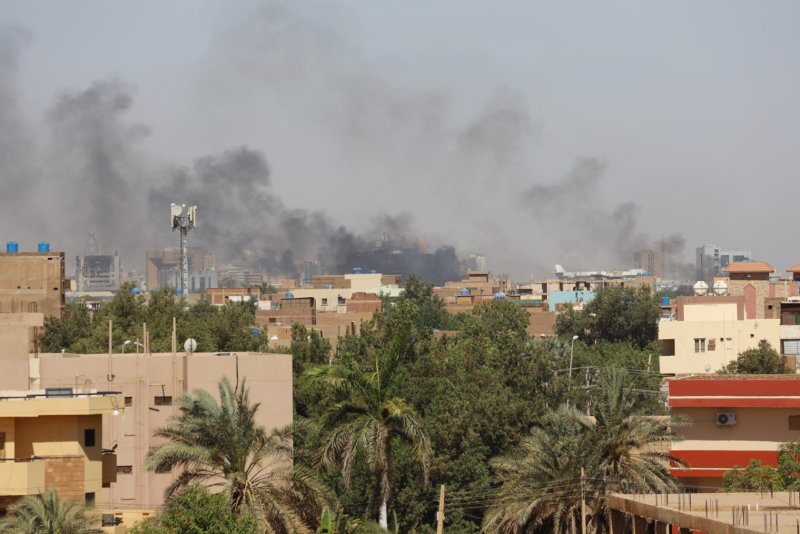Smoke rises over Khartoum, Sudan, during ongoing fighting between the Sudanese army and paramilitaries of the Rapid Support Forces. Photo by EPA-EFE
May 3 (UPI) -- The humanitarian affairs chief for the United Nations arrived in Sudan Wednesday as two rival military groups battling for control of the country agreed to a seven-day cease-fire to allow critical medical aid to be delivered.
Martin Griffiths, who also serves as the U.N.'s emergency relief coordinator, landed in Port Sudan about 3:27 a.m. EDT, to "reaffirm the U.N.'s commitment to the Sudanese people," he tweeted.
His arrival comes days after the North African nation received its first shipment of humanitarian aid since the war began between the Sudanese army and the breakaway paramilitary Rapid Support Forces nearly three weeks ago.
The combatants agreed to a new cease-fire that will last from Thursday until May 11, according to a statement by South Sudan's Ministry of Foreign Affairs and International Cooperation.
The latest truce was brokered by telephone Tuesday and follows an extended cease-fire last week that has since been marked by intermittent firefights.
As part of the latest deal, Sudan Armed Forces chief Gen. Abdel Fatah al-Burhan, and paramilitary leader Gen. Mohamed Hamdan Dagalo, have "agreed in principle" to peace talks that would be held soon at a neutral site, according to South Sudan President Salva Kiir Mayardit, who helped mediate the call.
Fighting broke out April 15 as a power struggle erupted between the former comrades who have ruled over Sudan since a 2021 coup but now bitterly disagree over the country's future.
Previously, the duo worked together to overthrow former President Omar al-Bashir, who was sentenced to two years in prison on corruption charges in 2019.
At least 450 people have been killed in the ongoing conflict as multiple nations have rushed to evacuate diplomats and citizens while humanitarian organizations have struggled to deliver aid.
The International Committee of the Red Cross said Sunday it had sent more than 8 tons of medical supplies to hospitals and humanitarian organizations throughout Sudan, even as fighting continued to create unsafe conditions for healthcare workers who were on the ground without water, electricity and basic medical supplies.
Meanwhile, more than 100,000 refugees have already fled the violence in Sudan while nearly 1 million evacuees could ultimately flood into neighboring countries, according to Olga Sarrado Mur, a spokesperson for the U.N. High Commissioner for Refugees who gave remarks Tuesday at the Palais des Nations in Geneva.
Many of the displaced rely on humanitarian aid to survive.
Mur said the UNHCR was "particularly concerned" about the humanitarian situation in Darfur, where the military conflict threatened to whip up ethnic tensions over land and access to resources.
The 55-member African Union has called on the international community to "speedily" extend humanitarian support to civilians fleeing the country.















